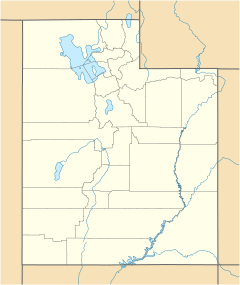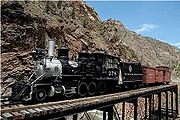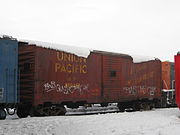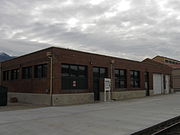- D&RGW 223
-
D&RGW 223 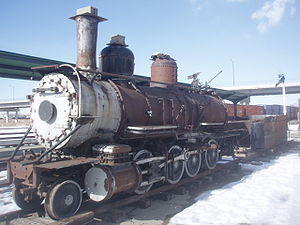
#223 undergoing restoration in 2010 Power type Steam Reference [1][2] Builder Grant Locomotive Works Serial number 1436 Build date December, 1881 Total produced 53 (Grant-28)
(Baldwin-25)Configuration 2-8-0 UIC classification 1′D n2 Gauge 3 ft (914 mm) Driver diameter 37 in (940 mm) Weight on drivers 59,330 lb (26.9 t) Locomotive weight 69,105 lb (31.3 t) Fuel type Coal Cylinders 2 Cylinder size 15 × 20 in (381 × 508 mm) Career D&RG » D&RGW Class D&RG: 60,
D&RGW: C-16Number in class 53 Number 223 Retired 1941 Current owner 1952: Salt Lake City
1979: Utah State Historical Society
1992: Utah State Railroad MuseumDisposition Static Display at Union Station, Ogden, Utah Grant Steam Locomotive No. 223Location: Union Station, Ogden, Utah Coordinates: 41°13′19.9″N 111°58′47.6″W / 41.222194°N 111.979889°WCoordinates: 41°13′19.9″N 111°58′47.6″W / 41.222194°N 111.979889°W Area: 1 acre (0.40 ha) Built: 1881 Architect: Grant Locomotive Works Architectural style: Consolidation type 2-8-0
Class C-16-60Governing body: Local NRHP Reference#: 79002501[3] Added to NRHP: May 23, 1979 Denver and Rio Grande Western 223 is one of a class of 28 2-8-0, Consolidation type, narrow gauge steam railway locomotives built for the Denver and Rio Grande Railroad by the Grant Locomotive Works of Paterson, New Jersey[4] in 1881-82. Number 223 was completed in December, 1881, at a cost of $11,553.[5] Baldwin built an additional 25 locomotives in the same class at the same time.[1]
Contents
Operational history
Although the Utah State Historical Society suggests that the 223 worked in Utah (the Utah operations of what became the D&RGW were narrow gauge until 1890),[6] and the 223's National Register of Historic Places nomination included this, the Rio Grande Modeling and Historical Society's roster of locomotives does not show it in the Utah section.[2] It was later concluded by Jerry Day that the 223 was never used in Utah.
On December 11, 1892, the Denver & Rio Grande's Salida shops and roundhouse caught fire. The fire started in the waste box in the cab of D&RG No.419 and spread to the oil-soaked floor. Due to the city's fireplugs being shut off because of cold weather, the shop burned to the ground, taking the 223 with it. The 223 was rebuilt soon after and placed back in service.
Only 13 years later, the 223 was involved in another roundhouse fire, this time in Gunnison on January 17 of 1905. The 223 again burned along with sister C-16 No. 218. Both locomotives were rebuilt, and the 223's tender tank was replaced in April of the same year.
The Rio Grande Southern Railway was known to lease locomotives from the D&RG. In 1907 the 223 and other C-16s were sent to the RGS, being returned to the D&RG in 1922. On September 12 of that year the 223 collided with C-16 no. 222 in Chama, New Mexico. No records of the damage to either locomotive were kept.[5]
The final location of the 223's operation comes from eight photographs taken by Otto Perry on July 4, 1940, showing 223 working the 18 mile Baldwin Branch,[1] with photographs at Gunnison, Dollard, Castleton, and Baldwin.[2] The Baldwin Branch was originally built by the Denver, South Park & Pacific (Colorado Southern) and retained its original wooden bridges. Due to the weight restrictions of these bridges, the remaining C-16s were the only locomotives permitted on the branch, and the 223 served on this portion of the D&RGW from 1937 to her retirement.[5]
Most of the C-16s were retired by the late 1920s-mid 1930s; only one stayed in service until the mid 1950s. The 223 was removed from service in 1941.[7]
On to Utah
The railroad leased 223 to Salt Lake City, beginning at the 1941 Pioneer Day celebration, for five years, and donated it to the city in 1952. The locomotive was given a fake diamond stack and an 1880s paint scheme in the Salida, Colorado, shops, before being sent to Salt Lake City. A popular myth, caused by the mis-captioning of photographs, is that the 223 was moved on a special train led by four brand-new FT locomotives. According to Jerry Day, noted Rio Grande historian, it was actually sister locomotive 268 that was shipped on this special train, not the 223. In 1952, upon the dontation to the city, the Rio Grande's Salt Lake City shops removed the diamond stack and box headlight and repainted the 223 in its 1930's "button herald" paint scheme on their own time.
Shipped along with the 223 were a narrow gauge boxcar, caboose, and high-side gondola, which were sent to Pioneer Villiage in the Lagoon Amusement Park in Farmington, Utah.[5] These cars were later stored in Ogden in poor condition alongside the 223 until they were burned in the 2006 Shupe-Williams Candy Factory Fire.
The 223 sat in the open at Liberty Park, gradually deteriorating from weather and vandalism until 1979, when the city gave it to the Utah State Historical Society. John Bush, employee of the Roaring Camp & Big Trees Railroad in California, was commissioned to make a report on the cost of potential restoration. Lack of budget limited success with the project and it was again transferred, to the Utah State Railroad Museum in 1992.[6] The 223 was stored behind the Shupe-Williams Candy Factory building just to the south of the Union Station, until the candy factory caught fire in 2006 and burned to the ground, taking with it three narrow gauge freight cars. Luckily the cab had already been removed from the engine before the fire. The 223 was then moved from there to its present location at the north end of the Utah State Railroad Museum complex next to the restoration shop. Limited restoration has been underway at its current location, Union Station, Ogden, Utah, with the tender and cab in the Museum's shop and the remainder sitting outside without boiler lagging.[8]
It has been long believed that during the 1979 move from Liberty Park to the Utah State Historical Society property, the frame and rods were bent badly so that the wheels will no longer turn, even with the rods disconnected. However, through analysis of historical photographs, it has been determined that the rods were in actuallity bent during its display at Liberty Park to prevent it from rolling. The track on which the 223 was displayed sloped noticeably to the west, with no wheel stops or other end-of-track protection. A flat spot can be felt under the main rod 1 on the Fireman's side of the engine where the jack was placed to bend it.[9] The boiler is in very poor condition, having sat outside for fifty years with wet asbestos around it. The tender is being entirely replaced.[2]
Restoration
Restoration work is being done by the Golden Spike Chapter of the Railway & Locomotive Historical Society in the former Trainman's Building at the North end of the Ogden Union Station, which can be accessed from the platform on Track 1. They meet on Saturday mornings.
Restoration began in 1992 using a boxcar, UP 910261, as a shop. The group soon outgrew this rudimentary shelter and was given the Trainman's Building after the Candy Factory Fire in 2006. Ogden City paid for roof repairs, an alarm system and fluorescent lighting, and the restoration work was moved inside. At the same time the 223 was moved from its place behind the Shupe-Williams Candy Factory to the north end of the platform outside of the shop.
Currently, the wooden cab is completed, the appliances are repaired, and work on the tender is nearing completion. As of 2010, the tender tank was being riveted, with over 3,000 hand-drilled rivet holes. The Golden Spike Chapter works according to the "pay-as-you-go" philosophy, completing work as they obtain the funds, which accounts for the slow, yet steady, progress of the restoration.[10]
It was added to the National Register of Historic Places as Grant Steam Locomotive No. 223 in 1979.[3]
130th Anniversary Celebration
2011 marks the 130th anniversary of the 223's construction (1881–2011). In addition, it is the 70th year since the 223's removal from service (1941) and the 20th year since she was moved to Ogden from Salt Lake City. To commemorate the event, the Golden Spike Chapter began uploading to YouTube videos from important events in the 223's recent history, such as the 1991 move from Salt Lake City and the 2006 Candy Factory Fire. The 130th anniversary was also featured in the December, 2010, issue of the Colorado Time-Table.
#278 is a Baldwin built sister of #223A Grant built sister, #220 in 1920The completly rebuilt cab, constructed using the original methodsThe 223 in 2010The boxcar originally used as the restoration shop.The former Trainmen's Building, the current restoration shop.References
- ^ a b c Official Roster No. 11 of the Denver and Rio Grande Western Railroad System. Denver: The Denver and Rio Grande Western Railroad System. April 1, 1923.
- ^ a b c d "Denver & Rio Grande Locomotive History: 223". Rio Grande Modeling and Historical Society. http://www.drgw.org/data/steam/history/drg223.htm. Retrieved 28 January 2010.
- ^ a b "National Register Information System". National Register of Historic Places. National Park Service. 2009-03-13. http://nrhp.focus.nps.gov/natreg/docs/All_Data.html.
- ^ "New Jersey's Locomotive Builders". New Jersey Railroad Information. http://njrails.tripod.com/Other_History/Builders/Locomotive_Building.htm. Retrieved 2 February 2010.
- ^ a b c d Jerry Day. History of D&RGW Locomotive Number 223.
- ^ a b "The Locomotive 223 Photograph Collection, 1978-1993". Utah State Historical Society. http://history.utah.gov/findAids/C01583/C1583ff.XML. Retrieved 28 January 2010.[dead link]
- ^ Jones, Larry; Harris, Lois (1978) (PDF). National Register of Historic Places Nomination: Grant Steam Locomotive No. 223. National Park Service. http://pdfhost.focus.nps.gov/docs/NRHP/Text/79002501.pdf."Accompanying 6 photos, from 1979" (PDF). National Register of Historic Places Inventory. http://pdfhost.focus.nps.gov/docs/NRHP/Photos/79002501.pdf.
- ^ "D&RGW Steam Locomotive #223". Ogden Union Station. http://www.theunionstation.org/museumsrailroad.html. Retrieved 28 January 2010.
- ^ "Stephen Smith". Narrow Gauge Discussion Forum. http://ngdiscussion.net/phorum/read.php?1,176074. Retrieved 14 January 2011.
- ^ "D&RGW 223 restoration project". Golden Spike Chapter, Railway & Locomotive Historical Society. http://www.trainweb.org/GoldenSpikeLRHS/.html. Retrieved 2 April 2010.
External links
- D&RGW 223 official website
- Golden Spike Chapter, R&LHS Video channel
- The 223's 130th Anniversary in the Colorado Time-Table
- The 223 in the Standard-Examiner
U.S. National Register of Historic Places Topics Lists by states Alabama • Alaska • Arizona • Arkansas • California • Colorado • Connecticut • Delaware • Florida • Georgia • Hawaii • Idaho • Illinois • Indiana • Iowa • Kansas • Kentucky • Louisiana • Maine • Maryland • Massachusetts • Michigan • Minnesota • Mississippi • Missouri • Montana • Nebraska • Nevada • New Hampshire • New Jersey • New Mexico • New York • North Carolina • North Dakota • Ohio • Oklahoma • Oregon • Pennsylvania • Rhode Island • South Carolina • South Dakota • Tennessee • Texas • Utah • Vermont • Virginia • Washington • West Virginia • Wisconsin • WyomingLists by territories Lists by associated states Other  Category:National Register of Historic Places •
Category:National Register of Historic Places •  Portal:National Register of Historic PlacesCategories:
Portal:National Register of Historic PlacesCategories:- National Register of Historic Places in Utah
- Transportation in Weber County, Utah
- Railway locomotives introduced in 1881
- Railway locomotives on the National Register of Historic Places
- 2-8-0 locomotives
- Individual locomotives
- Denver and Rio Grande Western Railroad locomotives
- Narrow gauge steam locomotives of the United States
Wikimedia Foundation. 2010.

